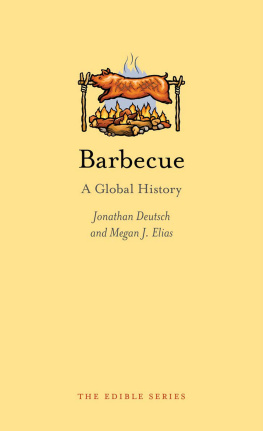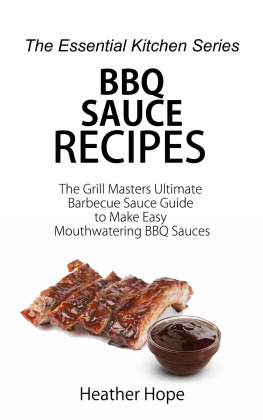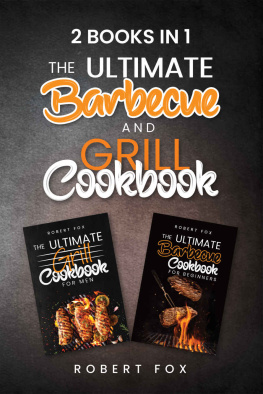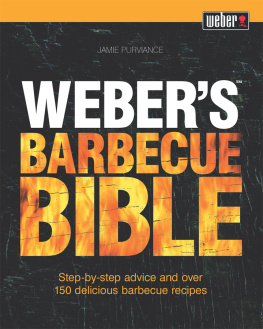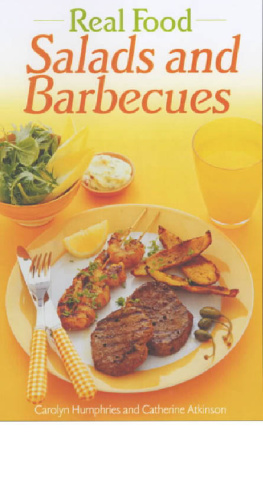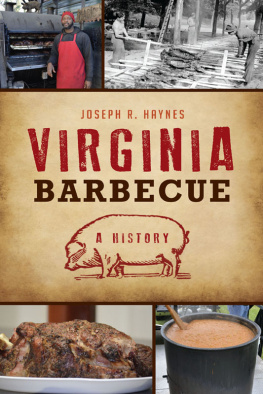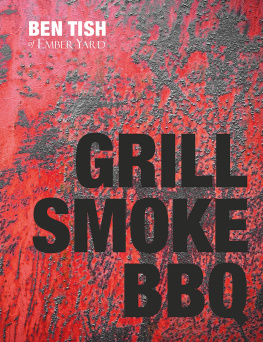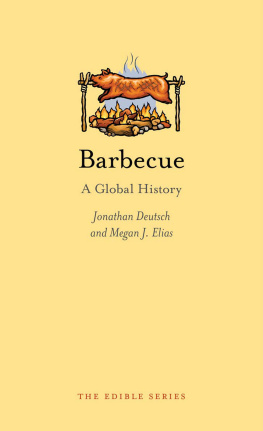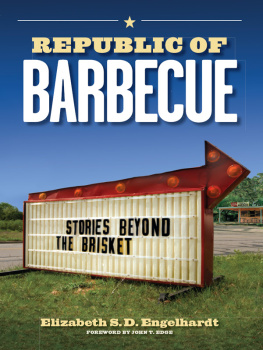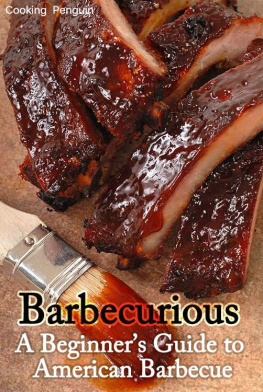BARBECUE

Edible
Series Editor: Andrew F. Smith
EDIBLE is a revolutionary series of books dedicated to food and drink that explores the rich history of cuisine. Each book reveals the global history and culture of one type of food or beverage.
Already published
Apple Erika Janik Barbecue Jonathan Deutsch and Megan J. Elias Beef Lorna Piatti-Farnell Beer Gavin D. Smith Bread William Rubel Cake Nicola Humble Caviar Nichola Fletcher Champagne Becky Sue Epstein Cheese Andrew Dalby Chocolate Sarah Moss and Alexander Badenoch Cocktails Joseph M. Carlin Curry Colleen Taylor Sen Dates Nawal Nasrallah Eggs Diane Toops Game Paula Young Lee Gin Lesley Jacobs Solmonson Hamburger Andrew F. Smith Herbs Gary Allen Hot Dog Bruce Kraig Ice Cream Laura B. Weiss Lemon Toby Sonneman Lobster Elisabeth Townsend Milk Hannah Velten Mushroom Cynthia D. Bertelsen Nuts Ken Albala Offal Nina Edwards Olive Fabrizia Lanza Oranges Clarissa Hyman Pancake Ken Albala Pie Janet Clarkson Pineapple Kaori O Connor Pizza Carol Helstosky Pork Katharine M. Rogers Potato Andrew F. Smith Rum Richard Foss Salmon Nicolaas Mink Sandwich Bee Wilson Soup Janet Clarkson Spices Fred Czarra Tea Helen Saberi Whiskey Kevin R. Kosar Wine Marc Millon
Barbecue
A Global History
Jonathan Deutsch
and Megan J. Elias
REAKTION BOOKS
Published by Reaktion Books Ltd
33 Great Sutton Street
London EC1V 0DX, UK
www.reaktionbooks.co.uk
First published 2014
Copyright Jonathan Deutsch and Megan J. Elias 2014
All rights reserved
No part of this publication may be reproduced, stored in a retrieval system, or transmitted, in any form or by any means, electronic, mechanical, photocopying, recording or otherwise, without the prior permission of the publishers
Page references in the Photo Acknowledgements and
Index match the printed edition of this book.
Printed and bound in China
by Toppan Printing Co. Ltd
A catalogue record for this book is available
from the British Library
eISBN: 9781780232591
Contents
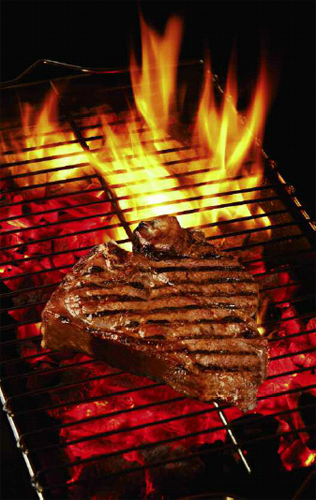
Introduction: Smoke and Meat

Barbecue occurs at the succulent intersection of smoke, seasoning and flesh. It is arguably the simplest form of cookery; no utensils, equipment or special skills are needed to produce some barbecue. One needs a fire, meat and some distance between the two. The rest, as a Talmudist would say, is commentary (we recognize the irony of quoting a rabbi in a barbecue book, given that barbecue is so often pork, but Jews barbecue too, as you shall see).
Much of this commentary is at best confusing, and often simply wrong. Even the English word barbecue is confusing, rivalling only the f-word for its versatility: it can be an adjective describing a method of cooking or seasoning; a noun describing a food, an event or a cooking contraption; or a verb. It can be spelled or abbreviated as barbecue, barbeque, BBQ, bbq, BB-CUE, bar-b-q or bar-b-cue but never barbe queue.
Table 1: The versatile and confusing language of the word barbecue
Part of Speech | Definition | Can You Use It In a Sentence? |
|
Noun | Food, usually meat, prepared by slow smoke roasting (barbecuing). | Honey, I have a hankering. Please pick up some barbecue on your way home? |
Noun | A gathering at which barbecued food is served. | Would you like to come over for a barbecue at my house this Saturday? |
Noun | A grill or other piece of equipment on which barbecued food is cooked. | The brisket that has been cooking on the barbecue should be done soon. |
Verb | To cook by slow smoke roasting (barbecuing). | I will barbecue these ribs char siu style. |
Adjective | Something that has been cooked by slow smoke roasting (barbecuing). | In Croatia, my favourite dish was the barbecue (or barbecued) lamb. |
Adjective | Something seasoned with smoke or spices referencing barbecue flavours. | One packet of barbecue crisps please. |
Adding to this confusion, all of the above uses of the term barbecue (so spelled throughout this volume) are correct and common. In addition, there are some improper and unacceptable uses of the term.
Table 2: Improper and inaccurate uses of the word barbecue
Part of Speech | Definition | Can You Use It in a Sentence? |
|
Verb | Cooking by direct grilling (not barbecuing). | Lets barbecue some hamburgers for dinner tonight. Properly: lets grill some hamburgers for dinner tonight. |
Adjective | Food that has been cooked by direct grilling. | Should we eat at a Korean barbecue restaurant tonight, where thin strips of meat are grilled for a few moments at the table? Properly: should we eat at a Korean grilled meat restaurant? |
As you have no doubt gathered, barbecue as properly defined, and as used throughout this book, refers to slow smoke roasting. In order to move forward with a working definition, lets examine each part of this term.
First, slow heat. When cooking on a fire or burning embers (coals), one can cook either directly above or below the coals, or indirectly, some distance away. Cooking above or below the coals or fire uses the radiant heat of the fire to quickly brown and cook the food. If the food is cooked above the radiant heat, the method is referred to as grilling; in the U.S. and Canada, cooking below the radiant heat is referred to as broiling. Neither one is barbecuing.
During barbecuing, air conducts the heat to the food, much as oil conducts heat during frying. The primary cooking process in barbecue is not radiation from the flames of the fire, but rather conduction of heat from the hot air surrounding the food, not unlike oven roasting. In some cases the food is placed a small distance away from the coals or fire for example, in a home grill one may place burning embers on one side of the grill and the food on the opposite side. In other instances the heat source may not even be in the same chamber as the food, and the heat and smoke may have to travel some distance through ducts.
The second part of our definition is smoke, which is an essential flavour really the only essential added flavour of barbecue. Therefore barbecue, as properly defined, cannot be cooked in the absence of smoke. When cooking solely on wood or charcoal, smokiness naturally occurs. When cooking with propane or electricity, smokiness must be added, most often through the use of wet wood chips or pellets that smoulder as the food cooks. While some barbecue purists would insist that it is impossible to cook real barbecue with the use of any fuel other than wood (some fundamentalists even reject lighter fluid or gas/electric ignition), as long as real wood or charcoal is present to provide smoke (not liquid smoke, a smoke flavouring), we would grant that the food meets the smokiness criterion.

